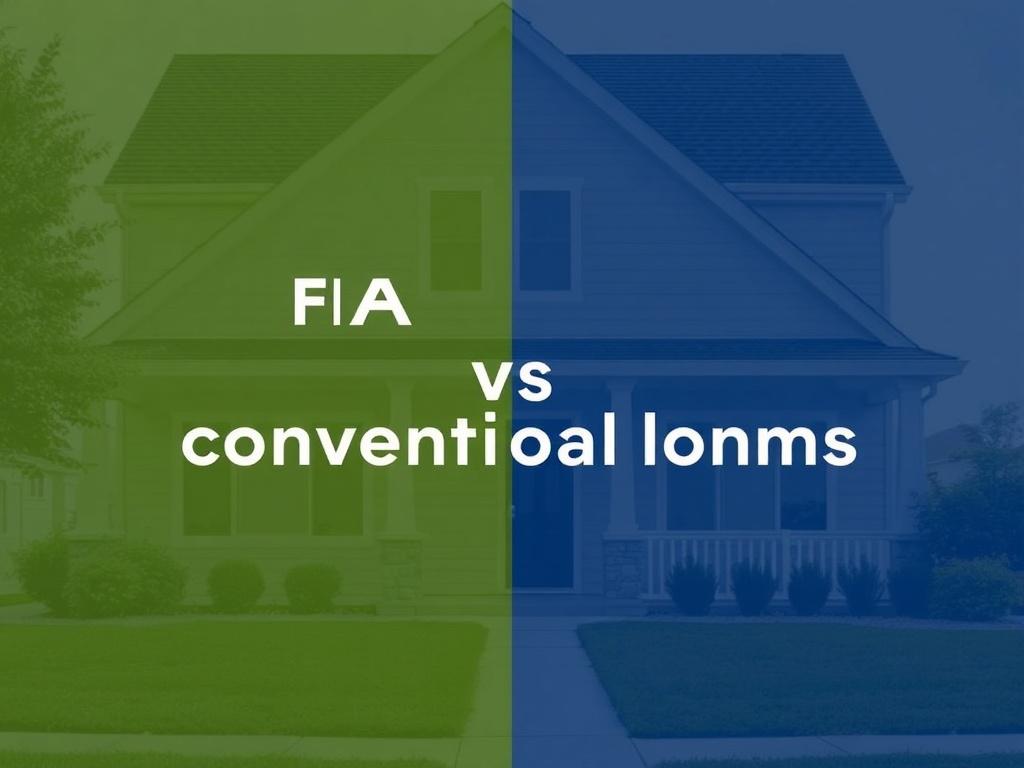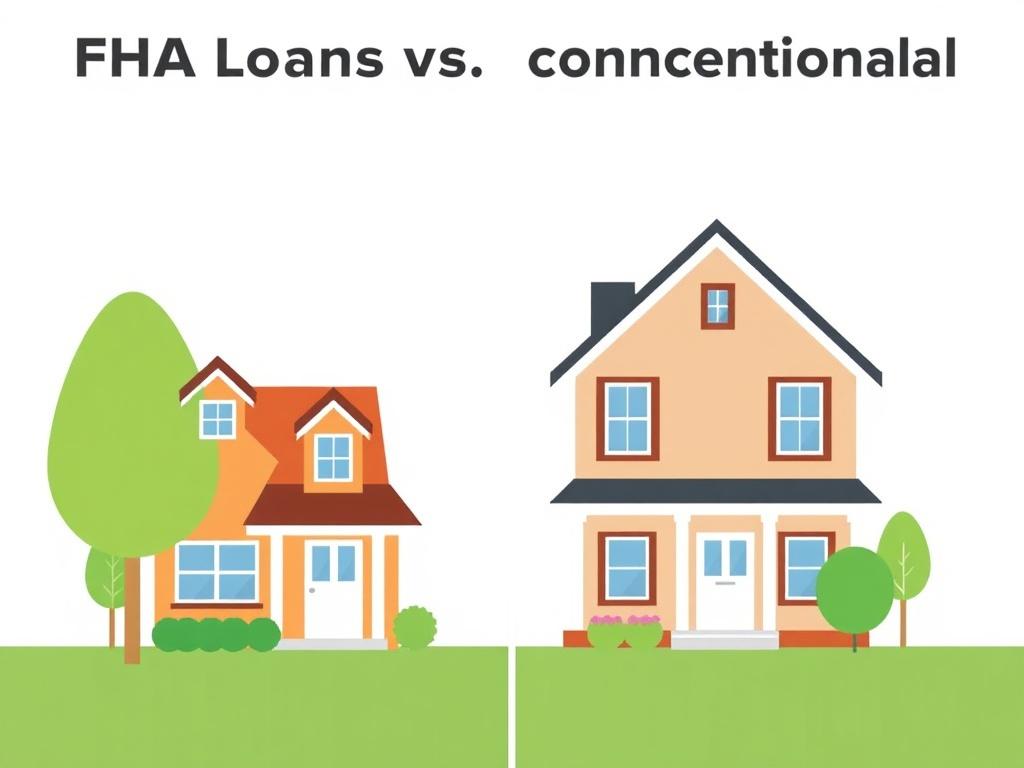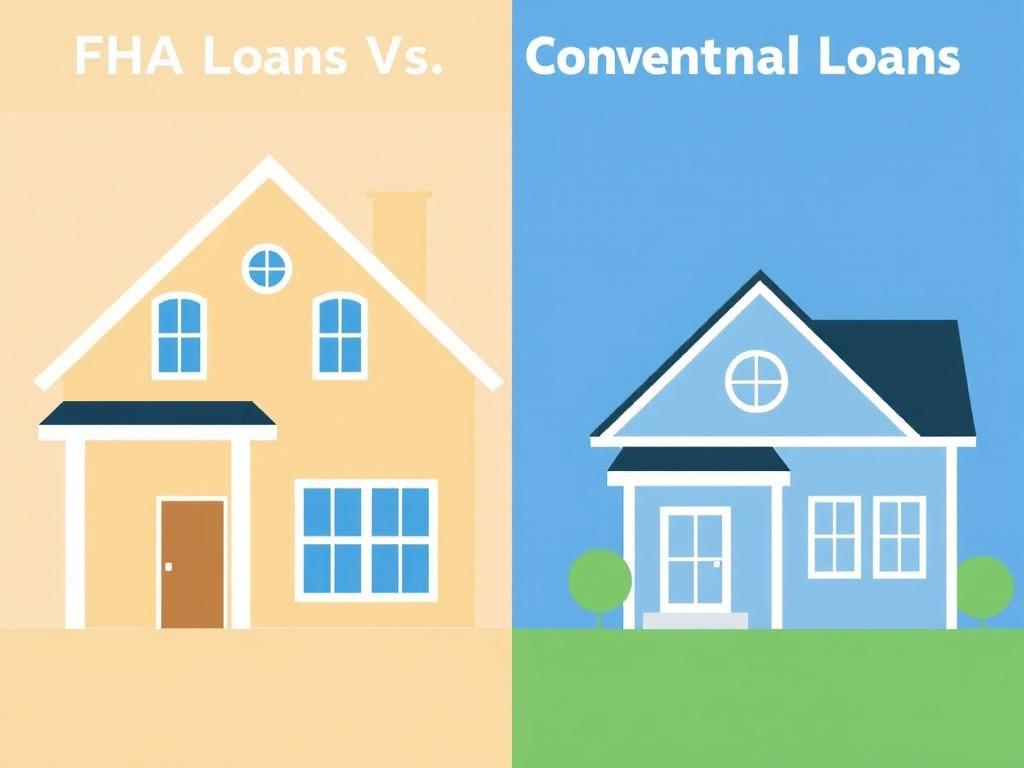SQLITE NOT INSTALLED
When it comes to buying a home, the mortgage you choose can make a significant difference in your financial journey. Two of the most popular types of loans available to homebuyers in the United States are FHA loans and conventional loans. Both have unique features, advantages, and often, challenges. But how do you decide which one fits your situation best? Understanding FHA loans vs. conventional loans can save you hundreds or even thousands of dollars over the life of your mortgage and help you find the path to homeownership with confidence.
Let’s dive deeper into what each loan entails. FHA loans are government-backed mortgages insured by the Federal Housing Administration, designed to help people with lower credit scores or smaller down payments get into a home faster. Conventional loans, on the other hand, typically come from private lenders such as banks or mortgage companies and are not insured by the government. This fundamental difference influences many other aspects of these mortgages, including qualification requirements, insurance costs, and loan limits.
Содержание
What Exactly Are FHA Loans?
FHA loans have gained a reputation for being friendly to first-time homebuyers and those who might not have perfect credit. Because these loans are insured by the FHA, lenders feel more confident offering them to borrowers who might be considered higher risk. That’s why FHA loans often come with lower minimum credit score requirements and smaller down payments compared to conventional loans.
For many borrowers, an FHA loan requires as little as a 3.5% down payment, which can be a game-changer if saving up for a home feels out of reach. However, this affordability comes with a requirement to pay mortgage insurance premiums (MIP), both upfront and annually, which protects the lender in case of default. Though this adds to your monthly payment, the initial accessibility often outweighs the downsides for buyers who need flexibility.
Key Features of FHA Loans
- Low down payment requirement (as low as 3.5%)
- More lenient credit score criteria (typically 580 and above)
- Mortgage insurance premiums required upfront and ongoing
- Loan limits vary by region but generally lower than conventional loans
- Assumable loans (meaning a future buyer can take over the loan)
Understanding these features helps potential borrowers see why FHA loans are often considered a great option for those who might have struggled to qualify for conventional financing.
What Are Conventional Loans?

Conventional loans are not insured or guaranteed by the federal government. Instead, they are offered by private lenders and can conform to guidelines set by government-sponsored enterprises like Fannie Mae and Freddie Mac. Because these loans are riskier for lenders, the requirements tend to be stricter, but the perks can be substantial.
One of the most significant distinctions is that conventional loans typically require higher credit scores and larger down payments compared to FHA loans. However, if you qualify, conventional loans often come with lower mortgage insurance costs or, in some cases, no mortgage insurance at all once you’ve put down at least 20%. This potential savings on mortgage insurance can make conventional loans a smart financial choice for many borrowers.
Main Characteristics of Conventional Loans
- Down payments as low as 3% for qualified borrowers
- Higher credit score requirements (typically 620 and above)
- Private mortgage insurance (PMI) required if down payment is less than 20%
- Loan limits generally higher than FHA loan limits
- Wide variety of loan types and terms available
With these characteristics in mind, conventional loans attract buyers who have a stronger credit profile and can afford a more substantial down payment.
Comparing FHA Loans vs. Conventional Loans: A Side-by-Side Look
When deciding between FHA loans vs. conventional loans, breaking down the differences into categories can clarify the bigger picture. Here’s a table that highlights some of the crucial factors:
| Feature | FHA Loans | Conventional Loans |
|---|---|---|
| Down Payment | 3.5% (with credit score 580+) | 3% or more (varies by lender and loan program) |
| Credit Score Requirement | Typically 580+ (can be as low as 500 with higher down) | Generally 620+ |
| Mortgage Insurance | Upfront + annual MIP for life of the loan (unless refinanced) | PMI required if down payment less than 20%, removable after 20% equity |
| Loan Limits | Set by county, often lower than conventional limits | Higher than FHA limits, vary by region |
| Assumable Loan | Yes | No |
| Ideal Borrower | First-time homebuyers, lower credit scores, small down payments | Buyers with higher credit scores and larger down payments |
This comparison underscores that neither FHA loans nor conventional loans are inherently better—your personal financial situation largely determines the best option.
Who Should Consider FHA Loans?

If you’re just stepping into the real estate market or have had financial challenges like bankruptcy or foreclosure in the past, an FHA loan could be your golden ticket. Since FHA loans allow for lower credit scores and smaller down payments, they make homeownership more accessible.
Additionally, investors and buyers in areas with lower home prices may find that FHA loan limits align closely with local market values, making FHA loans particularly attractive. The fact that FHA loans are assumable also broadens your potential buyer pool if you decide to sell your home in the future.
Here are some scenarios where FHA loans might be the best choice:
- You have a credit score between 580 and 620
- You have limited savings for a down payment
- You need more flexible qualification requirements
- You are buying a home in an area with lower property values
- You want access to a government-backed loan for peace of mind
Remember, FHA loans do make homeownership possible for many people who might otherwise struggle to be approved.
Who Stands to Benefit Most from Conventional Loans?
On the flip side, if your credit score is strong, your debt-to-income ratio is low, and you have savings for a sizable down payment (ideally 20% or more), conventional loans could save you considerable money over time. Conventional loans offer more flexibility with loan programs, better interest rates for higher credit scores, and the ability to avoid paying mortgage insurance once you reach 20% equity.
Additionally, if you plan to keep your home long-term and have a stable income, choosing a 15- or 30-year conventional loan can give you predictable payments and the potential for equity growth.
You might want to opt for a conventional loan if:
- Your credit score is above 620
- You have saved at least 5-20% for a down payment
- You wish to avoid paying mortgage insurance over the long term
- You want access to a wider variety of mortgage products
- You are buying a home in a higher-priced market where FHA limits are restrictive
The ability to cancel PMI on conventional loans once you have sufficient equity makes this option particularly appealing to many buyers.
Mortgage Insurance: A Closer Look
One of the biggest distinctions when weighing FHA loans vs. conventional loans is mortgage insurance. It’s important to understand how this affects your monthly payments and overall costs.
For FHA loans, borrowers pay an upfront mortgage insurance premium (usually 1.75% of the loan amount) at closing, along with an annual premium divided into monthly installments. Unlike conventional loans, FHA MIP generally lasts for the life of the loan unless you refinance into a conventional mortgage.
Conventional loans require private mortgage insurance (PMI) only if your down payment is less than 20%. PMI premiums vary by lender and can depend on your credit score and loan size, but a significant advantage is that PMI can be canceled once your equity reaches 20%, potentially saving you money in the long run.
Credit Score and Qualification Differences
If you’re wondering which loan type is easier to qualify for, FHA loans often win the battle here. FHA is known for being more lenient on credit scores when compared to conventional loans. However, eligibility doesn’t only hinge on your credit score; lenders also look at your income, debt levels, job stability, and other factors.
Generally, with FHA loans, the minimum credit score is 580, but if it’s between 500-579, a borrower might still qualify with a higher down payment (usually 10%). Conventional loans tend to require at least a 620 credit score or higher to qualify, but those with great credit may secure better rates or terms.
Credit Score Requirement Summary
| Loan Type | Minimum Credit Score | Down Payment Requirement Based on Score |
|---|---|---|
| FHA Loan | 580+ (can be as low as 500) | 3.5% at 580+, 10% if below 580 |
| Conventional Loan | 620+ | 3% or more depending on lender |
Down Payment Requirements and Assistance
Saving for a down payment is one of the biggest hurdles for homebuyers. FHA loans significantly reduce this barrier by requiring only 3.5% down for many borrowers, whereas conventional loans may ask for a bit more depending on your creditworthiness.
Additionally, many homebuyers find down payment assistance programs that specifically complement FHA loans, making the combination a helpful one for first-timers or those with minimal savings.
Loan Limits and Property Types
When evaluating FHA loans vs. conventional loans, it’s important to consider loan limits. FHA loan limits vary by county and are generally lower than those for conventional loans. If you’re looking at homes in expensive markets, you might quickly outgrow FHA loan limits and need to look at conventional financing or jumbo loans.
Both FHA and conventional loans allow purchases of various property types, including single-family homes, condos, and some multi-unit properties, but the specific requirements and approval processes can differ.
Interest Rates and Closing Costs
Interest rates on FHA loans are sometimes slightly lower than conventional loan rates because of the FHA’s government backing. However, this isn’t always the case, as interest rates fluctuate based on the borrower’s credit profile, market conditions, and lender competition.
Closing costs, which include fees for appraisals, inspections, and loan origination, tend to be similar between FHA and conventional loans, but FHA loans do include the upfront MIP, which adds to your initial out-of-pocket costs.
Typical Closing Costs Breakdown
- Loan origination fee
- Appraisal fee
- Credit report fee
- Title search and insurance
- Inspection fees
- Upfront mortgage insurance premium (FHA only)
Make sure to request a Loan Estimate early in the process to understand all costs involved clearly.
The Application and Approval Process
Both FHA and conventional loans follow similar application steps, including pre-approval, document submission, appraisal, underwriting, and closing. However, FHA loans might require more paperwork or inspection requirements due to government regulations.
Conventional loans can sometimes be faster in processing, especially if you have a strong credit profile. Yet, savvy borrowers will find that timing is just one of many factors to consider.
Popular Myths about FHA Loans vs. Conventional Loans
Many misconceptions surround these loans, so clearing them up can help you make a smart decision:
- Myth: FHA loans are only for first-time buyers.
Fact: FHA loans are available to repeat buyers, too. - Myth: Conventional loans always require 20% down.
Fact: Some conventional loans require as little as 3% down. - Myth: You can’t buy a fixer-upper with FHA loans.
Fact: You can with FHA 203(k) rehab loans. - Myth: FHA loans have worse terms than conventional loans.
Fact: FHA loans often have competitive interest rates but include mortgage insurance.
Understanding these facts can help avoid confusion and frustration when navigating home financing.
Which Loan Should You Choose? Factors to Consider
Choosing between FHA loans vs. conventional loans boils down to your personal financial profile and homeownership goals. Ask yourself:
- What is my credit score, and how does it impact loan options?
- How much can I afford to put down upfront?
- Am I comfortable paying mortgage insurance, and for how long?
- What is the price range of homes I am interested in?
- How long do I plan to stay in the home?
Answering these questions, alongside consulting with a trusted mortgage expert, can provide clarity to your decision.

Remember to shop around with multiple lenders and compare offers. Small differences in interest rates or fees can add up over time. Make sure to factor in your long-term plans: If you anticipate improving your credit score soon, it might be worth considering a conventional loan later. Alternatively, if you want to get into a home quickly with less cash upfront, the FHA route is a proven path.
More than anything, don’t rush the process. A mortgage is a long-term commitment that affects your financial health. Take your time, understand both FHA loans vs. conventional loans, and pick the option that aligns best with your unique situation.
Conclusion
Choosing between FHA loans vs. conventional loans is a significant decision on your homebuying journey, with no one-size-fits-all answer. FHA loans offer accessibility and lower upfront costs for those with limited savings or less-than-perfect credit, while conventional loans reward borrowers with strong credit and higher down payments by allowing them to avoid long-term mortgage insurance and potentially save money in the long run. By carefully considering your financial situation, credit profile, down payment capability, and homeownership goals, and by seeking expert advice, you can confidently select the mortgage that paves the way toward your dream home. Whether you lean toward FHA loans or conventional loans, informed choices are the foundation of successful and stress-free home financing.
Опубликовано: 23 July 2025 Кредитрон – блог о кредитах, финансах и прочих реверансах
Кредитрон – блог о кредитах, финансах и прочих реверансах

